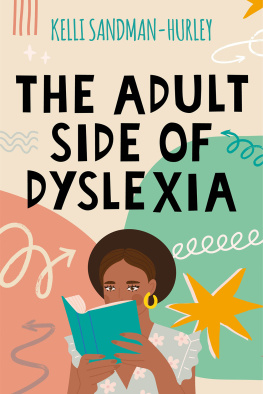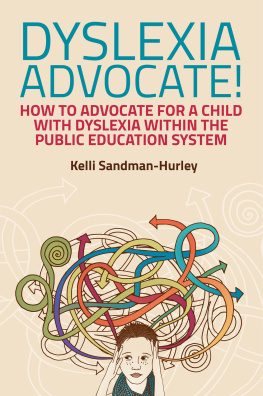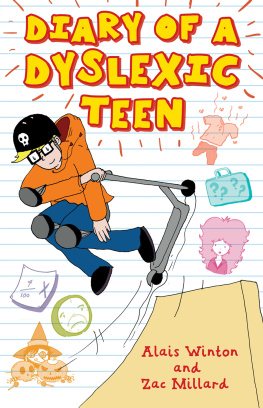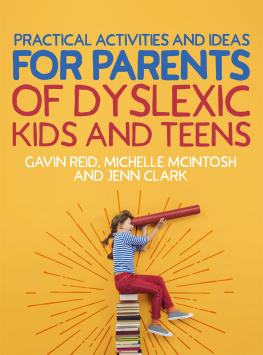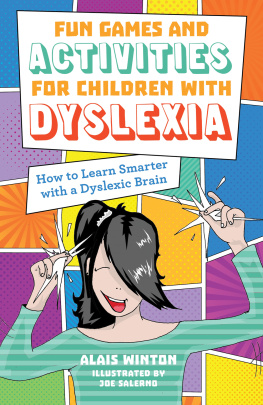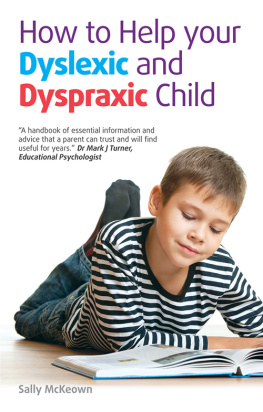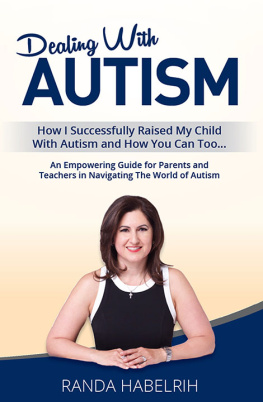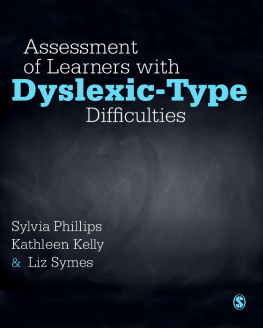Kathleen Nosek - The Dyslexic Scholar: Helping Your Child Achieve Academic Success
Here you can read online Kathleen Nosek - The Dyslexic Scholar: Helping Your Child Achieve Academic Success full text of the book (entire story) in english for free. Download pdf and epub, get meaning, cover and reviews about this ebook. year: 1995, publisher: Taylor Trade Publishing, genre: Children. Description of the work, (preface) as well as reviews are available. Best literature library LitArk.com created for fans of good reading and offers a wide selection of genres:
Romance novel
Science fiction
Adventure
Detective
Science
History
Home and family
Prose
Art
Politics
Computer
Non-fiction
Religion
Business
Children
Humor
Choose a favorite category and find really read worthwhile books. Enjoy immersion in the world of imagination, feel the emotions of the characters or learn something new for yourself, make an fascinating discovery.

- Book:The Dyslexic Scholar: Helping Your Child Achieve Academic Success
- Author:
- Publisher:Taylor Trade Publishing
- Genre:
- Year:1995
- Rating:5 / 5
- Favourites:Add to favourites
- Your mark:
- 100
- 1
- 2
- 3
- 4
- 5
The Dyslexic Scholar: Helping Your Child Achieve Academic Success: summary, description and annotation
We offer to read an annotation, description, summary or preface (depends on what the author of the book "The Dyslexic Scholar: Helping Your Child Achieve Academic Success" wrote himself). If you haven't found the necessary information about the book — write in the comments, we will try to find it.
The Dyslexic Scholar: Helping Your Child Achieve Academic Success — read online for free the complete book (whole text) full work
Below is the text of the book, divided by pages. System saving the place of the last page read, allows you to conveniently read the book "The Dyslexic Scholar: Helping Your Child Achieve Academic Success" online for free, without having to search again every time where you left off. Put a bookmark, and you can go to the page where you finished reading at any time.
Font size:
Interval:
Bookmark:
THE DYSLEXIC SCHOLAR
THE
DYSLEXIC
SCHOLAR
HELPING YOUR CHILD
SUCCEED IN THE SCHOOL SYSTEM
Kathleen Nosek

To all my friends, clients, and colleagues,
and, especially, to my grandson, Chris.
Copyright 1995 by Kathleen Nosek.
All rights reserved.
No part of this book may be reproduced in any formincluding photocopies and electronic reproductionwithout written permission from the publisher.
Letter to The Wall Street Journal, by David G. Durham, M.D., appearing on reprinted with permission of The Wall Street Journal 1989 Dow Jones & Company, Inc. All rights reserved.
Verbal address given by Nelson Rockefeller, appearing on reprinted with permission of TV Guide Magazine. Copyright 1976 by News America Publications Inc.
Published by Taylor Trade Publishing
An Imprint of the Rowman & Littlefield Publishing Group
4501 Forbes Blvd., Suite 200
Lanham, MD 20706
Library of Congress Cataloging-in-Publication Data
Nosek, Kathleen.
The dyslexic scholar; helping your child succeed in the school system / Kathleen Nosek.
p. cm.
Includes bibliographical references and index.
ISBN: 978-0-87833-882-5
1. Dyslexic childrenEducationUnited States. 2. EducationParent participationUnited States. I. Title.
LC4709.N67 1995
371.91'44dc20 94-45423
CIP
Printed in the United States of America
Distributed by National Book Network
INTRODUCTION
There are thousands of books, pamphlets, and teaching materials on the subject. In fact, there is more written about dyslexia than any other type of known learning disability. So why a how-to book on dyslexia? Whats yet unsaid? Dyslexia is a little-understood, hidden complaint thats passed back and forth between educators, physicians, psychologists, and opportunists. Dyslexia has always been a political hot potato nobody wants to claim. Educators assert children outgrow dyslexia, so we are not to worry. To many physicians, dyslexia is a total mystery and an undramatic one at that. Psychologists experiment with behavior modification. Scam artists promise to deliver quick fixes. How confusing this is for the layperson, and how humiliating for the dyslexic child or adult.
In truth, dyslexics are normal individuals who mask their learning disability by compensating in other ways. Many are average; some are below average. Others, like Albert Einstein, Thomas Edison, and Winston Churchill, achieve prominence through extraordinary achievement.
After 10 years of fighting the public school system in Texas in an effort to secure services for my dyslexic grandson, I decided it was time to share my experience in helping dyslexic children and adults. Let me assure you there is hope, and a way to win the battle, even though it seems the odds are stacked against you.
After a twenty-year career, during which I taught school, tutored, worked as a mental-health counselor, lectured, presented seminars, provided in-service training for other teachers, and edited The Language Link (a news bulletin), I went to serve as executive director of National Dyslexia Referral Center (NDRC).
At NDRC, a nationwide provider of dyslexia-related information and referrals, it soon became evident that no matter how much help we provided, the chasm between delivery of crucial information and implementation of the data was a nightmare for most callers. Responding to the need for how-to information became NDRCs most pressing mission, and often, even then we were unable to meet the publics needs.
Despite all the legislative mandates, both federal and state, and despite all NDRCs efforts to educate the public, nothing has changed in our schools! Dyslexia is still a closeted disorder; schools would rather label children as behavior problems than diagnose dyslexia. The end result is the public schools failure to educate, and a drop-out rate that is worse than ever.
I attribute the basic problem to these simple facts:
- Teacher trainingpoor or nonexistent
- Basic informationpoor access for the layperson
- Shamedyslexia is considered synonymous with dummy.
In response, I offer a step-by-step guide through the labyrinth of what to do when. So before you spend big bucks, waste time, and endure unnecessary heartache, get the facts first.
Much of the published literature concerns research, remediation, cures, psychological implications, and management techniques. For those who wish to pursue these aspects, I include an extensive bibliography.
Also, I use the D word, dyslexia, without apology. Lets call it what it is: dyslexia=trouble with words. Now, lets see how to make life more manageable for dyslexic children (and adults), including those dyslexic school administrators and teachers out there... you know who you are.
UNDERSTANDING DYSLEXIA
The term dyslexia comes from the Greek root dys (trouble) and lexia (word). Thus, dys^lexia means trouble with words. What kind of trouble? Simply put, dyslexia means trouble with reading, writing, and spelling.
This trouble can be expressed in a number of ways, including some of these commonly heard complaints: I spell perfectlyits my handwriting thats so awful or I can read; I just cant remember what Ive read or It takes me forever to figure out the words; I cant spell worth a darn, so I lose my concentration and give up.
Sound familiar? This happens to all of us at one time or another. Our previously beautiful handwriting becomes sloppy; were distracted and lose our place while reading; we misspell words out of carelessness or just plain forgetfulness. Before you come unglued, take a deep breath.
What I just described is normal for most of us. We catch our error right away and correct it. However, for 25 million Americans, it is normal to experience all of the above all of the time and not know the difference.
Impossible, you say. How could this happen? These people must be lazy. If they paid attention in school, they wouldnt make such stupid mistakes. Whats the big deal? If children choose to be lazy and inattentive at school, thats their problem. But what about children who do not choose to be lazy, who pay attention, give it their best shot, and still cant read?
THE DILEMMA
According to some educators, dyslexia is a figment of our imagination. Other proponents of the out-of-sight, out-of-mind theory say dyslexia is a medical problem and must be treated outside the school. Educators find it much easier to pin the blame for a childs reading difficulties on family problems, television, or the weather. To them, playing the blame game makes more sense than recognizing and taking responsibility for remediating dyslexia.
But-t-t-t... , the educators sputter, dyslexia is a disease and needs to be treated by medical doctors.
Says who? Dont believe that assertion for one minute.
But-t-t-t... , the educators sputter again, dyslexics are doomed; they cant go to college or get a job.
Aha! Thats my favorite answer. Ever hear of Tom Cruise? Agatha Christie? Woodrow Wilson? Nolan Ryan? These individuals are classic examples of dyslexics who beat the odds and became successful.
Now you are really confused. Just exactly what is dyslexia?
Heres a sampling of viewpoints that are generally accepted as theoretically sound and describe the issue quite well.
- Margaret B. Rawson, past president of the Orton Dyslexia Society (in Annals of Dyslexia, 1985)Dyslexia is a condition manifested by difficulty with learning to read and write efficiently despite the presence of normal intelligence, adequate educational opportunities, and normal psychiatric make-up.
Font size:
Interval:
Bookmark:
Similar books «The Dyslexic Scholar: Helping Your Child Achieve Academic Success»
Look at similar books to The Dyslexic Scholar: Helping Your Child Achieve Academic Success. We have selected literature similar in name and meaning in the hope of providing readers with more options to find new, interesting, not yet read works.
Discussion, reviews of the book The Dyslexic Scholar: Helping Your Child Achieve Academic Success and just readers' own opinions. Leave your comments, write what you think about the work, its meaning or the main characters. Specify what exactly you liked and what you didn't like, and why you think so.

